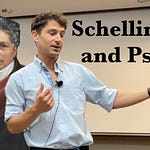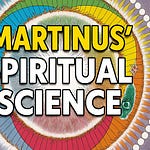I apologize for the sound quality… The lapel mics I got for this interview clearly didn’t work very well (despite the AI noise canceling feature!).
ChatGPT Summary of my dialogue with Robert Prentner:
1. Setting & Opening Exchange
Yerba Buena Gardens, San Francisco. Matt welcomes Robert, who is in town for a small symposium hosted by Joscha Bach on consciousness and AI.
2. Robert’s Turn Toward AI
Robert traces his intellectual path: for five-plus years he has pursued a mathematico-philosophical study of consciousness.
Initially skeptical of AI’s relevance, he changed his mind after hands-on experience with GPT-4 and Claude in 2023–24. Their coding competence and linguistic versatility convinced him they pose serious philosophical questions about cognition.
His current project: reframe “AI consciousness” so that it is not imagined as something magically generated inside computation but understood in relation to—and possibly as an access route to—an already-fundamental field of consciousness.
3. Mapping Metaphysical Options
Matt outlines four classic stances on mind–matter relations—physicalism, dualism, idealism, and panpsychism—and asks Robert to place himself.
Robert situates himself between idealism and panpsychism, sympathetic to Leibnizian and Whiteheadian currents, but wary of being boxed in by labels.
He rejects physicalism as both explanatorily barren (eliminative materialism) and existentially impoverished (no room for value, freedom, or meaning). Dualism fares no better: it leaves causal gaps.
4. Process, Time, and the Fallacy of Misplaced Concreteness
They probe Whitehead’s critique of “misplaced concreteness,” contrasting undermining reduction (materialism) with overmining reduction (some forms of idealism).
Robert admires Whitehead’s ambition to keep philosophy a “critique of abstractions” that welds common sense to speculative imagination.
A thorny issue: how to think genuine process (and creativity) if spacetime is itself emergent or an “interface.” Matt invokes Bergson’s durée and the Einstein–Bergson dispute; Robert presses for an account of process “without time.”
5. Large Language Models as Interfaces
Robert likens LLMs to early prototypes of perceptual “interfaces” (cf. Donald Hoffman): they compress vast corpora of human-generated meaning into usable symbol systems.
Both caution against literalizing metaphors (“the brain is a computer”) and against the cultic reification of “information” (Wheeler’s it-from-bit becomes, in Robert’s upgrade, it-from-bit-from-chit—consciousness).
They agree that information divorced from meaning and agency is just a new version of physicalism-plus, vulnerable to Whitehead’s same critique.
6. Agency, Embodiment, and Machine Consciousness
Drawing on enactivism and autopoiesis, Matt raises the argument that metabolic precariousness may be a prerequisite for sentient agency.
Robert distinguishes consciousness-as-such from perspectival, embodied subjectivity. Embodiment might be indispensable for our mode of agency, yet other architectures could instantiate agency differently.
Both foresee political and ethical battles over robot rights once behaviorally humanlike machines emerge. Different cultures may diverge sharply on whether such entities merit moral status.
7. Platonic Mediations and the Role of the Soul
Robert reaches for Platonic language: the soul mediates between ideals and empirical instantiation. LLMs might assist human beings in that mediating labor—if we approach them with explicitly metaphysical (rather than reductionist) sensibilities.
Matt notes a “tacit, unconscious Pythagoreanism” in much computational theory; better to be “a Platonist on purpose.”
8. Whitehead’s Theological Dimension
Matt summarizes Whitehead’s panentheistic God with primordial (mental) and consequent (physical) poles, raising the tension between perspectival pluralism and an all-embracing consciousness.
Robert suggests some metaphysical distinctions may be pragmatic artifacts—useful interfaces rather than ontological ultimates—but cautions against premature answers.
9. Ethics, Power, and Tech Capitalism
They converge on a warning: AI research is dominated by military–corporate interests whose incentives clash with philosophical and spiritual concerns.
The greater near-term peril may be not rogue superintelligence but widespread “moral atrophy” as humans outsource judgment, skill, and meaning-making to automated systems.
10. Personal & Spiritual Reflections
Invited to share his spiritual orientation, Robert recounts a high-school “letter to my future self” that prodded him to foster humanity’s spiritual evolution—an aspiration he still feels.
He resonates with the Vedic triad sat-chit-ānanda (being-consciousness-bliss) and sees the AI era as demanding renewed attention to existential and ethical questions long neglected under market logics.
Both agree philosophers must join the technological conversation lest the future be shaped solely by profit and power.
11. Closing
The talk ends on a sober yet hopeful note: “We’ve got our work cut out for us,” Matt says. Robert concurs, expressing gratitude for the dialogue and anticipation of further exchanges at the symposium.











